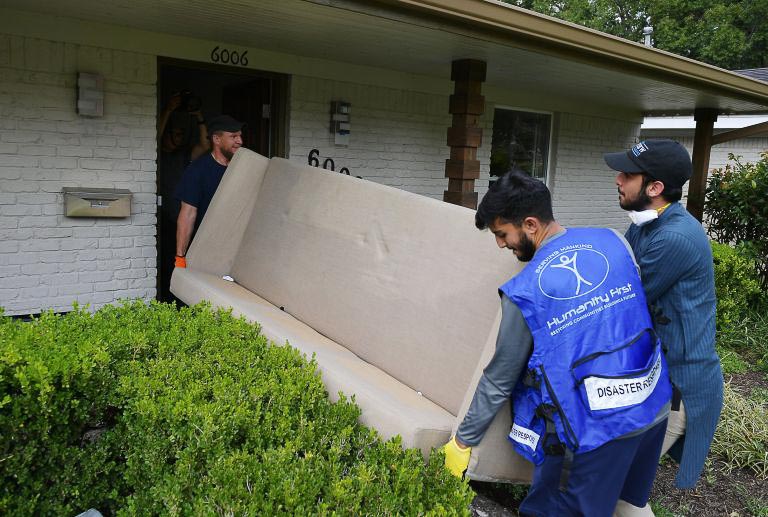Rahman Nasir is a psychology student at the University of Houston, a lifelong Houstonian and a local organizer with the Ahmadiyya Muslim Youth Association, an international organization founded in 1938. When Harvey hit, he knew he had to help. Having volunteered in relief efforts before through his organization, he organized with them again to do boat rescues and muck houses, particularly in Kashmere Gardens in northeast Houston. His group gained national media attention but he said this is just the type of work his group does and what they'll continue to do moving forward. "Now that the temperature has changed about Islam in the country we’re getting more coverage," he said, "but we've been here."
This interview has been condensed and edited for clarity.
How did you fare in the storm? What was the experience like for you and others from the Ahmadiyya Muslim Youth Association?
I was stuck at home during the whole storm, three days at home in Bellaire.
I did go through Hurricane Ike a few years back. This was completely different. Initially I wasn’t really worried. But once I started seeing the rain, I'd wake up three or four times for two nights just to check the water levels. I've been in Houston my whole life. I've never really seen anything like that.
There are 700 members of our whole Ahmadiyya community in Houston and only one or two needed to be rescued. Overall, I think we were lucky.
So once you took stock, when and how did you decide to help?
On the third day, I started getting worried, are we going to run out of food? That’s when I started feeling some concern. Going on Twitter and seeing people doing boat rescues made me feel the need to help and feel kind of useless.
We had a group of guys with big trucks, they had some extra food and they distributed that and that’s when our efforts really started.
We had a member who owns a boat in Dallas. We reached our team there an they had two guys come down with the boat. We did boat rescues for three days. I think we did a total of 21 rescues.
We wanted to go into shelters but there was so much help there and it didn’t seem like the best way to help. We looked into helping elderly folks clean out their houses. We did that in Meyerland for about two days and then we realized, there was a lot of help there, lots of church groups. We were looking for low-income neighborhoods, people that might not be getting the help they need. Online we didn’t find anything, just one story that said northeast Houston had been hit.
Once we went over to Kashmere Gardens and saw the situation, it was unbelievable. These houses were far worse in damage, none of them had homeowners insurance, nobody was there, it was just us.
We had about 100 people out in Kashmere Gardens, helping lift heavy things and taking down drywall. I think we helped upwards of 100 families over about a two-week span.
It was awesome because we developed a relationship and we plan on continuing [that] relationship.
So it took a little bit to kind of find where you felt was the best use of your services, how did you approach organizing and what kind of lessons did you take from the experience?
I had minimal experience. Last year in Louisiana there was flooding, our organization was present in Greenspoint. All I knew going in was we need to take down the drywall and move big furniture.
The first few days with the drywall, we'd just knock it down and spend a lot of time shoveling but then we figured out to take it out in panels. It was a lot more efficient. By the end of it, we consider ourselves experts. At home now, I think yeah I can knock this down.
The organization partners with a disaster relief organization who did have experience and they were providing guidance and supporting us, making sure we had our masks on. Safety and sanitation was huge. I'm 23 myself and there were lots of younger guys, we’re just college kids, high school kids who had some time off school and even after we went back, we made an effort to go back. We’d talk every night and debrief.
If I could back in time, I would focus initially [on] those low-income neighborhoods. I feel like they always get neglected. They were right off Greens Bayou, some of the houses were so damaged it was beyond comprehension.
Did Harvey change how you feel about Houston?
I've always loved Houston a lot but I did see how we came together in this time and that’s something that will stick with me forever. It was really inspiring to see honestly, it didn’t feel like the same Houston I grew up in.

